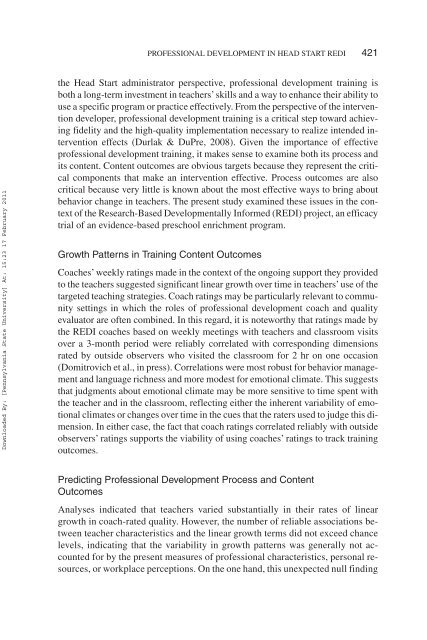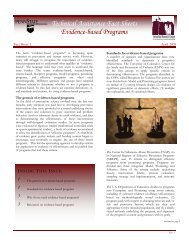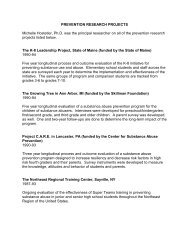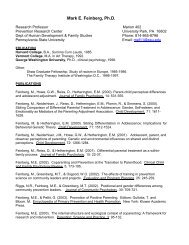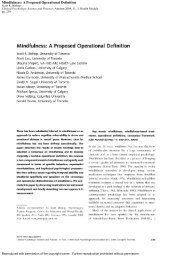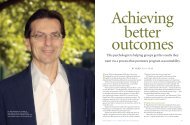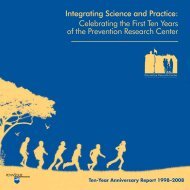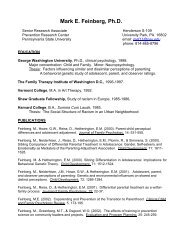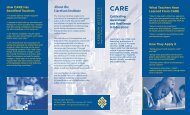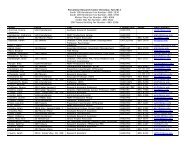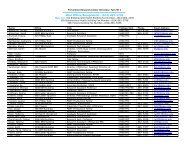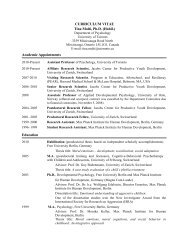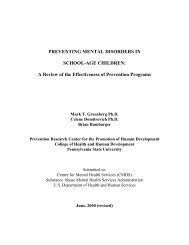Early Education & Development Individual Factors Associated With ...
Early Education & Development Individual Factors Associated With ...
Early Education & Development Individual Factors Associated With ...
You also want an ePaper? Increase the reach of your titles
YUMPU automatically turns print PDFs into web optimized ePapers that Google loves.
PROFESSIONAL DEVELOPMENT IN HEAD START REDI 421<br />
Downloaded By: [Pennsylvania State University] At: 15:23 17 February 2011<br />
the Head Start administrator perspective, professional development training is<br />
both a long-term investment in teachers’skills and a way to enhance their ability to<br />
use a specific program or practice effectively. From the perspective of the intervention<br />
developer, professional development training is a critical step toward achieving<br />
fidelity and the high-quality implementation necessary to realize intended intervention<br />
effects (Durlak & DuPre, 2008). Given the importance of effective<br />
professional development training, it makes sense to examine both its process and<br />
its content. Content outcomes are obvious targets because they represent the critical<br />
components that make an intervention effective. Process outcomes are also<br />
critical because very little is known about the most effective ways to bring about<br />
behavior change in teachers. The present study examined these issues in the context<br />
of the Research-Based <strong>Development</strong>ally Informed (REDI) project, an efficacy<br />
trial of an evidence-based preschool enrichment program.<br />
Growth Patterns in Training Content Outcomes<br />
Coaches’ weekly ratings made in the context of the ongoing support they provided<br />
to the teachers suggested significant linear growth over time in teachers’ use of the<br />
targeted teaching strategies. Coach ratings may be particularly relevant to community<br />
settings in which the roles of professional development coach and quality<br />
evaluator are often combined. In this regard, it is noteworthy that ratings made by<br />
the REDI coaches based on weekly meetings with teachers and classroom visits<br />
over a 3-month period were reliably correlated with corresponding dimensions<br />
rated by outside observers who visited the classroom for 2 hr on one occasion<br />
(Domitrovich et al., in press). Correlations were most robust for behavior management<br />
and language richness and more modest for emotional climate. This suggests<br />
that judgments about emotional climate may be more sensitive to time spent with<br />
the teacher and in the classroom, reflecting either the inherent variability of emotional<br />
climates or changes over time in the cues that the raters used to judge this dimension.<br />
In either case, the fact that coach ratings correlated reliably with outside<br />
observers’ ratings supports the viability of using coaches’ ratings to track training<br />
outcomes.<br />
Predicting Professional <strong>Development</strong> Process and Content<br />
Outcomes<br />
Analyses indicated that teachers varied substantially in their rates of linear<br />
growth in coach-rated quality. However, the number of reliable associations between<br />
teacher characteristics and the linear growth terms did not exceed chance<br />
levels, indicating that the variability in growth patterns was generally not accounted<br />
for by the present measures of professional characteristics, personal resources,<br />
or workplace perceptions. On the one hand, this unexpected null finding


